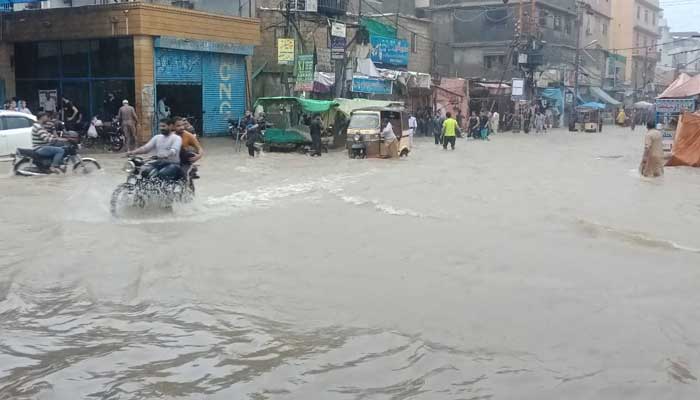Karachi rains: Helpline numbers in case of emergency
Karachi emergency numbers: At all costs one must be careful to avoid electrocution and other accidents whenever it rains heavily
By Web Desk
August 27, 2020
As rain continues to lash Karachi, Sindh and other parts of the country during the monsoon season, these tips may come in handy during the rainy season.
At all costs one must be careful to avoid electrocution and other accidents whenever it rains heavily.
A lot of Karachi's problems are due to a lack of proper drainage system which triggers urban flooding. However, these are some of the precautionary measures that Karachiites can use to be prepared for the rain.
Emergency numbers
The following emergency numbers are useful to keep in case an emergency. We pray that you do not.
- Army Flood Control Centre in Karachi: 1135, 021-34491082, 021-99247267 and 021-99207795
- Sindh Rangers: Helpline - 1101, Whatsapp - 0347-9001111
- PDMA Sindh Emergency Operations Centre: 021-99332003, 99332005, 35381810, 0335-5557362 or Helpline - 1736
- Edhi Information: 115, 02132340066, 02132340077
- Police Helpline: 15, 02199212652, 02199212634
- K-Electric complaint: 118
Commissioner Control Room Help Line:
021 99203443, 021 99205634- DC South Control Rome Help Line: 02199202822, 0346 3202130
Electric Shock
- Water is a very good conductor of electricity and in rains if power lines break and fall into a pool of water it can become a deathtrap so be weary of them.
- Avoid walking outside during heavy rainfall.
- If going outdoors is a must, then avoid wading through water if you spot broken power lines in water.
- If you spot broken power lines then inform K-Electric on their helpline (given above).
- Avoid touching wet electrical switches such as doorbells
Protect your vehicle
- If you venture outside then make sure your vehicle is equipped to deal with the torrential downpour.
- Make sure your windscreen wipers are functioning properly
- The most common reason for of vehicle breakdown is when water is sucked into the exhaust pipe when the car goes through water. Usually connecting a high-grade piece of pipe to make sure water does not find its way into the exhaust can make the difference between a car stalling and running during heavy rainfall.
- Keep you headlights and hazards on high beam as visibility may get affected during the downpour.
- Adjust how you drive according to the weather. You will have to drive slower and pay more attention to the road than usual to avoid skidding, slipping and causing a collision.
- Depending on your vehicles it may not be advisable to drive through water deeper than a few inches without hydroplaning - which is when your tyres lose contact with the road.
- If your vehicle begins to skid, do not slam the breaks, remain calm and guide your vehicle in the direction you wish to proceed.
Protect your home
- The most common damage to homes is done by water creeping in through open windows, leaky roofs, skylights, and from terraces without proper drainage.
- Ensure all windows and skylights are shut properly to avoid water coming into you home.
- For areas open areas such as terraces where water may collect, including rooftops, make sure all drainage points are unclogged so water doesn't get accumulated. If the water is accumulated then it may find a way inside the house from under doors and cracks.
- Make sure all open electrical wires are properly sealed. Avoid using any electrical appliances in open areas.
- If there are trees near your house, cut of all dead branches which may cause damage if they rip off due to strong winds and rain.
- For those people who have basements in their houses, purchase sandbags to keep the water at bay and avoid flooding your basement. Be prepared to move furniture to higher floors in case water does break your sandbag barriers.
- Make sure you have a stocked First Aid kit.
- Stock up on batteries and flashlights, as the power is likely to go out.
- Charge your cellphone and any devices you might need during a power breakdown.
- Stock up on essentials
- While the rainfall is unlikely to have any long term impact. It is advisable to stock up on essentials to avoid venturing out during heavy rainfall.
-
Security forces gun down 30 terrorists in multiple IBOs in KP: ISPR
-
MQM-P calls for new province in Sindh
-
US report validates Pakistan military edge over India: PM
-
Banned TTP poses serious threat to Pakistan security: UNSC panel
-
CM Afridi clarifies remarks on by-poll after ECP requests army deployment
-
Dubai sees 3.2m Pakistani passengers in 2025 as airport sets new milestone
-
Security forces kill 23 Indian proxy terrorists in KP's Kurram
-
Pakistan to construct island to boost oil exploration: report












